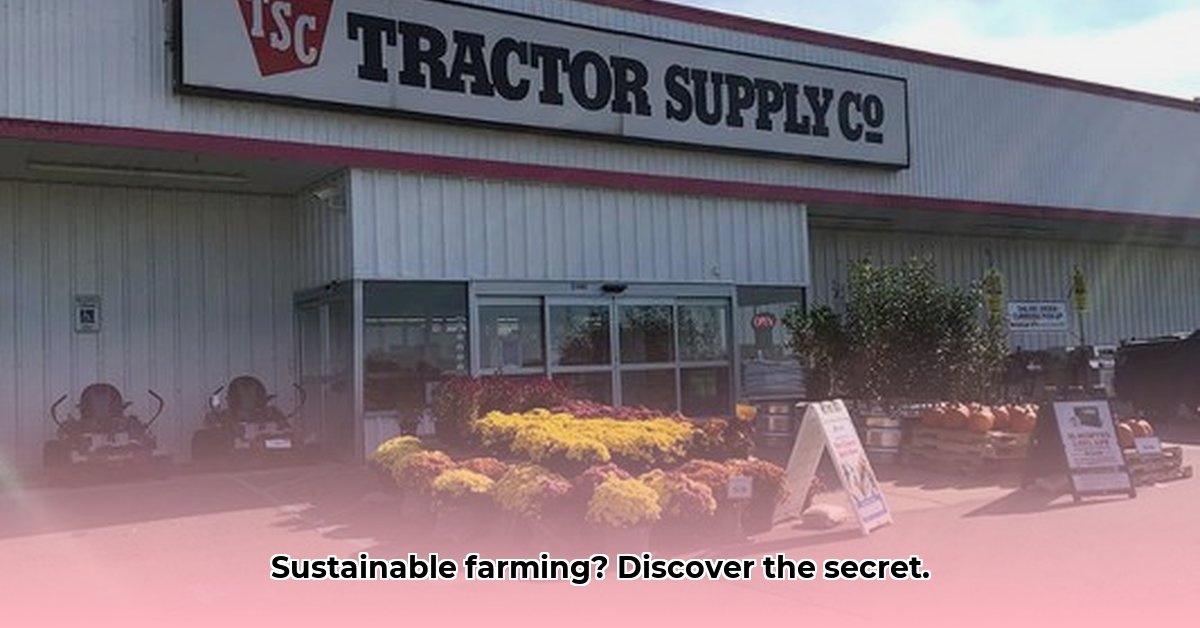
Tractor Supply Battle Creek: A Closer Look at Sustainable Farming Practices
Tractor Supply Company (TSC) in Battle Creek, Michigan, serves as a vital resource for local farmers and gardeners, offering a wide array of products that can support sustainable agricultural practices. However, the extent of its contribution to a greener future requires a nuanced examination. While the store provides readily accessible tools and supplies, a critical analysis reveals both its potential and its shortcomings in fostering truly sustainable agriculture within the Battle Creek community. For more information on the Battle Creek store, visit the store page.
Exploring Tractor Supply Battle Creek: A Convenient Source of Sustainable Tools
TSC in Battle Creek stocks a surprising range of items that directly support sustainable farming methods. Organic seeds, for example, promote soil health and minimize the need for chemical fertilizers. Durable fencing materials are ideal for rotational grazing, improving pasture health and reducing soil degradation. Efficient irrigation systems, also widely available, conserve this precious resource. But is the mere availability of these items sufficient to drive meaningful change? A deeper dive reveals a more complex picture. Does the convenience of access translate into the widespread adoption of sustainable farming practices?
Beyond the Shelves: Addressing the Gaps in TSC's Sustainability Narrative
Despite offering products with the potential to support sustainable agriculture, TSC falls short in terms of transparency regarding its own sustainability initiatives. Crucially, information on the sourcing of its lumber and its overall carbon footprint remains elusive. This lack of transparency hinders informed consumer choices, making it difficult for those seeking to support businesses actively committed to environmental responsibility. What are the ethical and environmental implications of this lack of information? Many shoppers want assurances their purchases aren't contributing to unsustainable practices.
The Local Impact: A Mixed Bag of Opportunities and Challenges
TSC's influence on Battle Creek's farms and gardens is indirect but undeniably significant. The store provides the tools, but the responsibility of using them sustainably rests with the consumer. The accessibility of these resources broadens the reach of sustainable practices, but simply having access isn't a guarantee of their adoption. How can we ensure that the availability of these products translates into a widespread shift towards sustainable agricultural practices?
The Path Forward: Collaboration for a Greener Future
TSC's role in fostering sustainable agriculture within Battle Creek can be significantly enhanced through a combination of internal improvements and community-based initiatives.
1. Transparency and Traceability: TSC needs to conduct comprehensive sustainability audits of its supply chain and provide clear labeling indicating sustainably sourced materials. Knowing the origin of products empowers consumers to make truly informed, eco-conscious choices. This transparency is crucial for building consumer trust and driving positive change.
2. Empowering Consumers Through Education: Educating consumers about sustainable practices is paramount. TSC could offer workshops, informational materials, or collaborate with local experts to guide customers toward informed decision-making and responsible resource management. Educated consumers wield immense power in driving market demand for sustainability.
3. Community Partnerships: TSC should actively engage with the Battle Creek community through partnerships with local organizations and initiatives. Supporting community gardens, providing educational resources, or sponsoring sustainable farming workshops will amplify TSC's positive impact and demonstrate a genuine commitment to environmental stewardship. Does TSC have a vested interest in empowering local sustainable agriculture?
A Broader Perspective: The Ecosystem of Sustainable Agriculture
TSC's contribution to Battle Creek's sustainable agriculture is just one piece of a complex puzzle. Local regulations regarding pesticide use, water management, and animal welfare significantly impact the overall agricultural landscape. These regulations, in turn, influence TSC's operations and its ability to promote ecologically sound practices.
Navigating TSC for Sustainable Choices: A Practical Guide
Making sustainable choices at TSC requires careful consideration and a proactive approach.
- Prioritize Organic: Opt for USDA-certified organic seeds and fertilizers whenever possible, significantly reducing the reliance on environmentally harmful chemicals.
- Seek Durable Products: Choose long-lasting, durable tools and equipment to minimize waste and reduce the frequency of replacements.
- Examine Packaging: Look for products with minimal or recycled/biodegradable packaging, demonstrating a commitment to reduced environmental impact.
- Engage with Staff: Don't hesitate to inquire directly about product sourcing and manufacturing practices. TSC staff can sometimes provide valuable insights.
- Local Synergies: Supplement TSC purchases with products from local, sustainable farms and businesses, creating a robust network of support for sustainable agriculture.
TSC holds significant potential to contribute positively to Battle Creek's sustainable agricultural future. However, realizing this potential necessitates increased transparency, proactive community engagement, and conscious consumer choices. The path toward a truly sustainable agricultural landscape is a collaborative journey, and TSC has a crucial role to play.
Tractor Supply Battle Creek
Content about tractor supply battle creek (Auto-generated fallback due to API error).